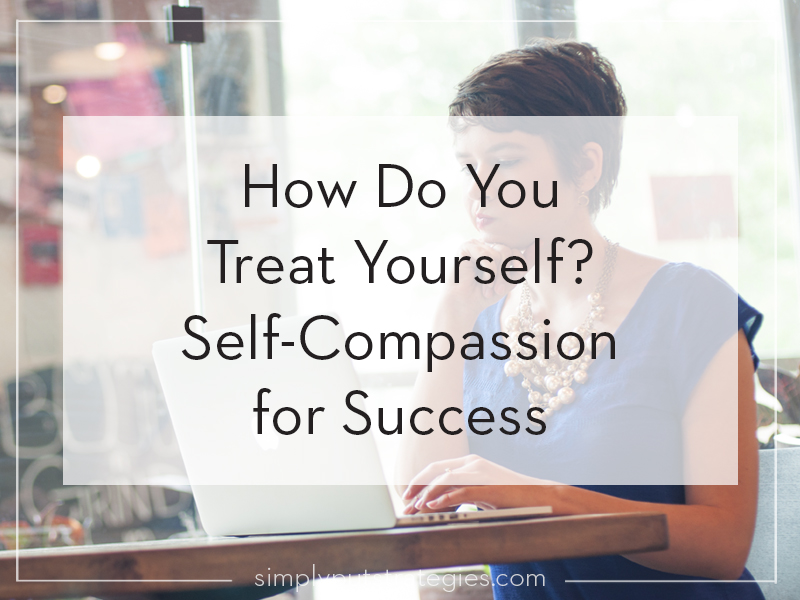 What is your internal monologue like?
What is your internal monologue like?
We are always thinking: assessing, reflecting, and planning around the circumstances of our lives. If we have high standards for ourselves, the character of our thoughts can be pretty negative. I strive to reach a certain level of productivity and to make certain progress every day. I’m hard on myself when I fall short. I berate myself, or simply feel bad, if I don’t finish my to-do list in a day.
The truth is that I’m not always kind to myself. I don’t treat myself the way I would a best friend. Can you relate? I hardly realized that my self-treatment had taken such a negative turn until I read “Don’t beat yourself up,” an essay on self-compassion by Mark Leary.
Since starting my business, the amount of pressure I feel to succeed has skyrocketed. At the same time, I’ve forgotten to be open-minded about how my business unfolds. Entrepreneurs carry a lot of responsibility on our shoulders. We are accountable for every facet of our business. If something goes awry, we must resolve it from start to finish. For fear of screwing up, we may hold ourselves to unrealistic or impossible standards. Instead of meeting the pressure and our performance with self-compassion, we can become rigid. Are you hard on yourself?
Self-compassion is not the same as self-esteem
In Leary’’s words,
“Self esteem has long be lauded as the ticket to a happy, healthy life. We’ve read about it often, particularly in the realm of childrearing and teenagers. It means to think well or highly of ourselves. But studies have found that it is much less related happiness than originally thought. Rather self esteem is likely to come because of success or achievement, rather than lead to accomplishments…. That is, the difference lies not so much in how people evaluate themselves (their self-esteem) but rather in how they treat themselves (their self-compassion).”
It makes sense: I feel good when I achieve something that I worked toward. My self-esteem is correlated with my success. Though I evaluate my ideas well at their inception, I feel a sense of pride and accomplishment as I see the difference they make in my clients’ lives. As I sell the services and assess their usefulness, I can improve. How I evaluate what I do will change as I help more people and become better at my profession.
Of course, it’s good to evaluate ourselves as good and worthy people, with confidence that we can contribute to others. That level of self-esteem is helpful. But thinking that we are good and worthy is different than treating ourselves as though we are good and worthy. Often, we treat ourselves quite harshly, and berate ourselves for making mistakes or not getting things done.
Yet treating yourself well is a far cry from relentless positive thinking or forced good cheer. Treating yourself with kindness requires honesty: being honest when we’ve made an error, and doing our best to fix it. It does not mean pretending everything is fine all the time. But good treatment does not extend into endless mean-spirited chatter. As Leary puts it, “self-compassion is based on wanting the best for oneself.“ Who would argue with that?
How we treat ourselves
Leary points out that,
“In an odd sort of way, these people [who push and berate themselves] are rather mean to themselves, treating themselves far more harshly than they treat other people. However, we all also know people who take a kinder and gentler approach to themselves. They might not always be happy with themselves, but they accept the fact that everyone has shortcomings and problems, and don’t criticise and condemn themselves unnecessarily for the normal problems of everyday life.”
Self-compassion is a way to treat ourselves. Would you ever say to a friend anything close to the kind of self-flagellation you mentally dish out to yourself? When we don’t practice self-compassion we are doing exactly that: beating ourselves when we’re down. How do you want your family, coach, and friends to treat you? With support, empathy, encouragement, and feedback. All delivered kindly, gently, or sometimes, insistently. While building and running businesses, we can be a best friend to ourselves. The magic is that this has little to do with how well we think we’re doing. As we make mistakes or our business fails, we can still be compassionate to ourselves. A good friend offers consistent support.
Are you trying to fuel your success by being hard on yourself? Next time something does not go as planned, pretend the situation happened to a friend. Imagine that you are comforting them. You don’t have to pretend to be happy about what happened, but you can remind your “friend” that mistakes happen. It doesn’t mean that they are a bad person.
It is good to reflect on situations that don’t go well, and consider how to avoid them in the future. If a friend is experiencing a challenge, we help them process the situation by discussing what led up to it, how it was handled in the moment, and how to make amends afterwards. Reflecting and learning from our decisions is how we improve and succeed. But instead of being compassionate with ourselves, many of us take this stage too far, and stew in guilt and shame. We do ourselves a better service by forgiving ourselves for making mistakes. No one is perfect.
How to practice self-compassion
Like many of the good things in life, learning to be compassionate to oneself is simple. Simple, but not easy. Here is how you can try it at home:
- Notice instances when you are not being nice to yourself. When you make a mistake or lose a client or something goes not-as-planned, pay attention to the thoughts running through your mind. Write them down.
- Ask yourself why. I find it helpful to do this out loud or on paper. Why do I think losing a client means I’m a failure? Remember to think of yourself as a friend. If you were telling a friend that she is a failure and she asked why, what would you say?
- When things don’t go the way you hope, remember that you are not alone in your struggle. As Leary says, “when bad things happen or you behave in a less-than-desirable way, remind yourself that everyone fails, misbehaves, is rejected, experiences loss, is humiliated, and experiences myriad negative events.” You are in good company.
Sometimes you may need to practice meta-self-compassion: be kind to yourself about how hard it is to be kind to yourself. You may be breaking years, if not decades, of a habit of being mean to yourself. It will take more than a few days to turn that self-talk around. When you notice that you are being hard on yourself, don’t be harder! Instead, remind yourself that everyone makes mistakes, just like you.
Your business, your clients, your family and your friends all benefit from a kinder, gentler, more patient version of you. Compassion perpetuates itself: as you practice and model it, you will have more of it to offer your clients and community. The kinder you are to yourself, the better you will feel. The better you feel, the more you have to give. This leads you to success – and not just the kind of success that is measured in money or accolades, but the kind of success that is internal: a relationship with yourself that is supportive, motivating, and compassionate. The ups and downs that life brings will be easier to face when YOU are a best friend to yourself.
(photo by Sam Czeh)







 Here you’ll find answers to FAQs about LinkedIn strategy, such as “should I put the link in the post or comments? Why?”
Here you’ll find answers to FAQs about LinkedIn strategy, such as “should I put the link in the post or comments? Why?”